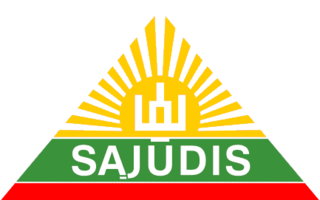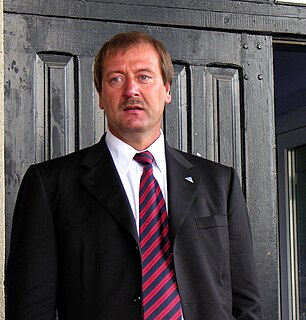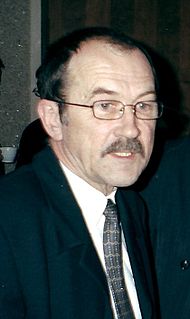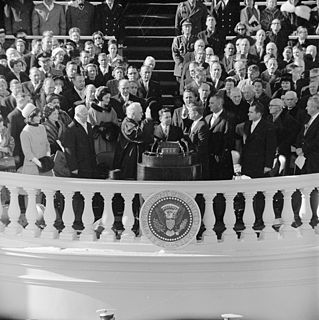
Politics of Lithuania takes place in a framework of a unitary semi-presidential representative democratic republic, whereby the President of Lithuania is the head of state and the Prime Minister of Lithuania is the head of government, and of a multi-party system.

Algirdas Mykolas Brazauskas was the second President of a newly independent post-Soviet Lithuania from 1993 to 1998 and Prime Minister from 2001 to 2006.

The Social Democratic Party of Lithuania is a social-democratic political party in Lithuania. Founded as an underground Marxist organization in 1896, it is the oldest extant party in Lithuania. During the period of Soviet occupation, the party was forced into exile, emerging once again in Lithuania in 1989.

The New Union was a social-liberal political party in Lithuania. The NS was a member of the European Liberal Democrat and Reform Party (ELDR) and an observer of the Liberal International. It was founded in 1998 and is led by Artūras Paulauskas.
Ringaudas Bronislovas Songaila was an official of the Lithuanian SSR nomenclatura.

Elections in Lithuania gives information on elections and election results in Lithuania.

Sąjūdis, initially known as the Reform Movement of Lithuania, is the political organisation which led the struggle for Lithuanian independence in the late 1980s and early 1990s. It was established on 3 June 1988, and was led by Vytautas Landsbergis. Its goal was to seek the return of independent status for Lithuania.
Stasys Lozoraitis was a Lithuanian diplomat. He was a son of Stasys Lozoraitis (1898–1983) and brother of Kazys Lozoraitis.

Parliamentary elections were held in Lithuania on 10 October 2004, with a second round on 24 October 2004 in the constituencies where no candidate won a majority in the first round of voting. All 141 seats in the Seimas were up for election; 71 in single-seat constituencies elected by majority vote and the remaining 70 in a nationwide constituency based on proportional representation.
Virgilijus Juozas Čepaitis is a Lithuanian publisher and translator, best known for his involvement in the Sąjūdis independence movement. He was the Executive Secretary of Sąjūdis and a member of its Initiative Group. He was also a signatory of the Declaration of the Restoration of Independence of Lithuania on March 11, 1990.
The Lithuanian legislative elections for 141 seats in the Supreme Soviet of the Lithuanian SSR were held in the Lithuanian SSR on 24 February with run-off elections on 4, 7, 8 and 10 March 1990. In six constituencies voter turnout was below required minimum, therefore a third round was held on April 7 and 21. For the first time since the election to the People's Seimas in 1940, non-communist candidates were allowed to run. It was the first and the only free multi-party elections in Soviet Lithuania. Pro-independence Sąjūdis movement refused to become a political party and endorsed candidates of various other political parties based on their personal merits. These endorsements often meant more than official party affiliations, and Sąjūdis-backed candidates won 91 out of 135 seats. During its third session on 11 March 1990, the Supreme Soviet of the Lithuanian SSR adopted the Act of the Re-Establishment of the State of Lithuania thus declaring Lithuania's independence from the Soviet Union.

Romualdas Ozolas was a Lithuanian politician, activist, writer and pedagogue who taught at Vilnius University. He was a member of the Lithuanian branch of the Communist Party of the Soviet Union from 1973 to 1990, and a member of the Lithuanian independence movement, Sąjūdis from 1988 to 1990. In 1988, he founded the cultural Vilnija organisation. From 1990 to 1991 he served as Deputy Prime Minister of Lithuania together with Algirdas Brazauskas. He joined the Lithuanian Centre Union in 1993 and became its chairman until 2000. In 1996, he was elected to the Seimas and served until 2000. From 2003 to 2007 he chaired the National Centre Party (NCP), since renamed the Lithuanian Centre Party (LCP) in 2005. He was a winner of the Stasys Šalkauskis prize.

Parliamentary elections were held in Lithuania in two stages on 25 October and 15 November 1992. All 141 members of the Seimas, which replaced the Supreme Council, were elected; 70 based on proportional party lists and 71 in single member constituencies. Where no candidate gained more than 50% of the vote on 25 October, a run-off was held on 15 November. The first round of the elections were held simultaneously with a referendum on the adoption of a new constitution.

Parliamentary elections were held in Lithuania in two stages on 20 October and 10 November 1996. All 141 seats in the Seimas were up for election; 70 based on proportional party lists and 71 in single member constituencies. Where no candidate gained more than 50% of the vote on 20 October, a run-off was held on 10 November.
The Lithuanian Liberty League or LLL was a dissident organization in the Lithuanian Soviet Socialist Republic and a political party in independent Republic of Lithuania. Established as an underground resistance group in 1978, LLL was headed by Antanas Terleckas. Pro-independence LLL published anti-Soviet literature and organized protest rallies. While it enjoyed limited popularity in 1987–1989, it grew increasingly irrelevant after the independence declaration in 1990. It registered as a political party in November 1995 and participated in parliamentary elections without gaining any seats in the Seimas.

The Sixth Seimas of Lithuania was the first parliament (Seimas) elected in Lithuania after it restored independence on 11 March 1990. Elections took place on 25 October 1992, with the second round on 15 November. In a surprisingly decisive outcome, the elections were won by Democratic Labour Party of Lithuania (LDDP), with 73 seats. The result reflected widespread dissatisfaction with the economic situation and the policies of the ruling Sąjūdis political movement in the preceding Supreme Council of Lithuania.
Juozas Bulavas was a Lithuanian legal scholar, academic, political and social figure, and member of the Seimas.
Vytautas Einoris was a Lithuanian agronomist, politician, former member of the Seimas and Minister of Agriculture.
Lubys Cabinet was the 5th cabinet of Lithuania since 1990. It consisted of the Prime Minister and 17 government ministers.
















